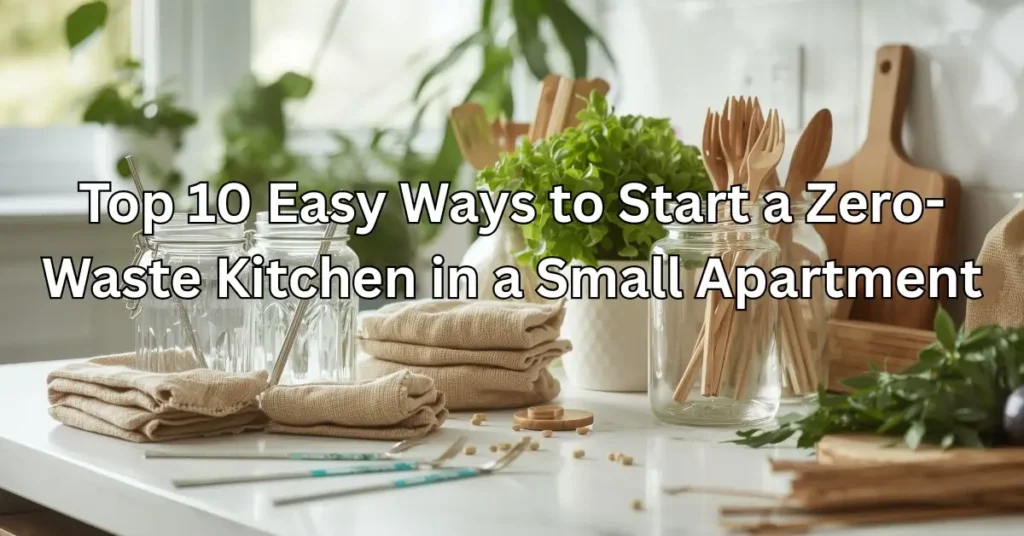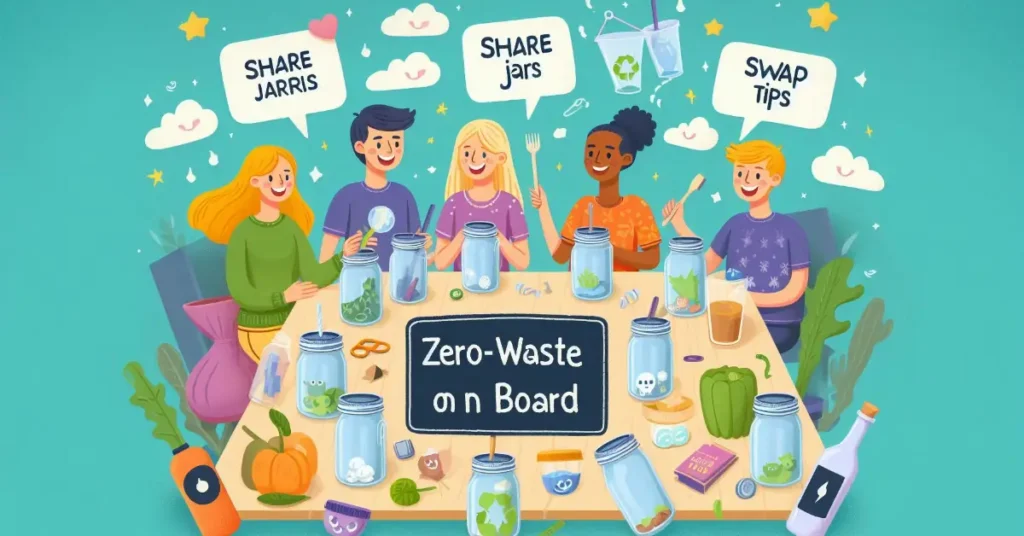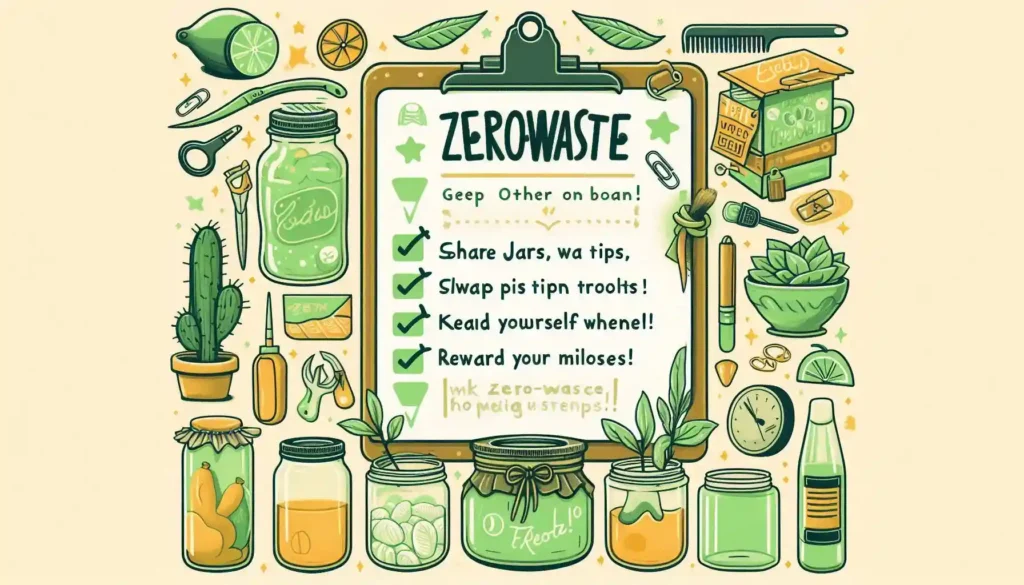You may not have a lot of space, money, or time here are Top 10 Easy Ways to Start a Zero-Waste Kitchen in a Small Apartment.You want to waste less and live better. That’s where the idea of a zero-waste kitchen comes in.
Don’t worry this doesn’t mean you have to throw away everything and start over. You can build a low-waste kitchen step by step, using simple things you already have. And guess what? It can actually save you money and space both super important when you’re on a scholarship.
Let’s explore 10 smart and simple ways to get started even in the tiniest apartment!
Also Read : Research Dairy

Use What You Already Have
Before buying anything new, check your kitchen.
- Got empty peanut butter jars or pasta sauce bottles? Clean them and reuse.
- Have old food containers with lids? Perfect for leftovers or snacks.
You don’t need fancy glass jars to go zero-waste. Using what you already have is the best first step.
Student tip: Ask roommates or family if they have extra containers, bags, or utensils they don’t use.
Buy in Bulk (and Skip the Plastic)
Instead of buying small plastic-packed items, try to buy in bulk. This means buying dry items like:
- Rice
- Pasta
- Lentils
- Oats
- Spices
Bring your own small containers or cloth bags to the store. You’ll reduce trash and usually spend less, too.
Example: Instead of buying five small packets of rice, fill one big jar from a bulk bin. Less plastic, more savings.
Carry Reusable Bags and Wraps
Plastic bags are used once, then thrown away. You can stop this by carrying:
- A cloth bag or tote
- A couple of produce bags (for fruits and veggies)
- Reusable food wraps (like beeswax or cloth)
These are easy to fold and fit into your backpack.
DIY Idea: Cut an old T-shirt and tie the bottom now you’ve got a free produce bag
Start Small-Scale Composting
Yes, even in an apartment, you can compost! This means turning food scraps into natural soil instead of tossing them into the trash.
What you can compost:
- Veggie peels
- Banana skins
- Coffee grounds
- Eggshells
You can:
- Use a small bin on your kitchen counter
- Freeze scraps in a bag and drop them off at a local compost center
- Ask a neighbor or community garden if they accept scraps
Real-life tip: One student used a small sealable box under the sink to hold scraps for the week and dropped them off every Sunday.

Plan Your Meals Ahead
A lot of kitchen waste comes from buying too much food and forgetting it in the fridge. Meal planning helps you eat what you buy.
Start by:
- Making a shopping list
- Cooking a few meals ahead
- Freezing leftovers
This helps you avoid waste and saves money, too.
Try This: Write down 3 meals for the week using things you already have. Only buy what’s missing.

Store Food the Right Way
Smart storage keeps food fresh longer and reduces waste.
Try these easy hacks:
- Store greens in a damp cloth inside a container
- Keep herbs standing in a glass of water
- Freeze leftovers in labeled containers
- Save glass jars for soups, sauces, and even snacks
Quick tip: Overripe bananas? Freeze them for smoothies or make banana pancakes!
Skip Single-Use Stuff
Say “no thanks” to:
- Plastic forks, spoons, or straws
- Takeout containers
- Paper napkins and towels
Instead, carry your own simple zero-waste kit:
- One fork and spoon
- A small napkin
- A foldable cup or container
Student Hack: Keep your kit in your backpack so you’re always ready even during long classes or study nights.
Make Simple Homemade Cleaners
Forget plastic bottles filled with harsh chemicals. You can make safe, natural cleaners at home using:
- White vinegar + water (great all-purpose cleaner)
- Baking soda (good scrub for sinks and surfaces)
- Lemon peel or a few drops of essential oil for fresh smell
Use the same spray bottle again and again no waste!
Extra Tip: Cut old clothes into rags for cleaning. Saves money and trees!
Buy Less, Use More
You don’t need five pans or ten cups. Keep it simple.
Only keep what you really use:
- 1 or 2 pots
- A few dishes and bowls
- One good knife and a cutting board
Less stuff = less cleaning and less clutter.
Mindful Reminder: Every time you want to buy something new, ask: “Do I really need this, or do I already have something that works?”
Support Local Stores with Less Packaging
If you have a local market, grocery co-op, or refillery near your apartment that’s gold!
They often sell:
- Fresh fruits and veggies without plastic
- Bulk dry goods
- Eco-friendly home supplies
You help the planet AND support small businesses.
Scholar Life Tip: Try visiting a local market once a month. Bring your own bags and jars it’s a fun and money saving habit.
Absolutely! Here’s a clear, helpful, and easy-to-understand table that summarizes the Top 10 Zero-Waste Kitchen Tips from the article. This can be used for quick reference, printing, or sharing.
Zero Waste Kitchen Tips for Students in Small Apartments
| Tip # | What To Do | Why It Helps | Easy Example / Student Hack |
|---|---|---|---|
| 1 | Use What You Already Have | Saves money, reduces waste | Reuse pasta sauce jars or takeout containers |
| 2 | Buy in Bulk with Your Own Bags | Avoids plastic, often cheaper | Bring a jar or cloth bag to refill rice or spices |
| 3 | Use Reusable Bags & Wraps | Reduces single-use plastic | Make a bag from an old T-shirt |
| 4 | Start Small-Scale Composting | Keeps food scraps out of landfills | Freeze scraps and drop at a community compost site |
| 5 | Plan Meals Ahead | Reduces food waste and saves money | Plan 3 meals using what’s in your fridge |
| 6 | Store Food the Right Way | Keeps food fresh longer | Store herbs in water, freeze leftovers |
| 7 | Skip Single-Use Items | Avoids unnecessary trash | Carry a reusable fork, napkin, and small container |
| 8 | Make Simple Natural Cleaners | Saves money and avoids plastic bottles | Use vinegar and water in a spray bottle |
| 9 | Buy Less, Use More | Saves space and reduces clutter | Stick with 1-2 pans, a few dishes, and multipurpose tools |
| 10 | Support Local and Low-Waste Stores | Cuts down on packaging waste | Shop at markets with loose produce and bring your bags |
FAQs
Can I start a zero-waste kitchen in a small apartment?
Yes! You don’t need a big space. Just start small reuse jars, plan meals, and store smart. Even a tiny kitchen can make a big difference
Is zero-waste living expensive for a student?
Not at all! It can actually save money. You buy less, waste less, and reuse more. Simple swaps like DIY cleaners or cloth bags cost little to nothing.
How can I compost without a garden?
Use a small bin on your counter or under the sink. Freeze scraps if needed and drop them at a compost site or local garden. Easy and clean!
What’s the easiest way to start?
Pick one habit like skipping plastic bags or reusing containers. Start small, keep it simple, and build from there.
How do I reduce waste when eating out?
Bring your own fork, napkin, or container. Ask restaurants to skip plastic. Every small action helps just be prepared!
Final Thoughts
Starting a zero-waste kitchen doesn’t mean changing everything overnight. You don’t need to be perfect. It’s not all or nothing. The key is to start small and keep going.
Even one tiny habit like saving a glass jar, skipping a plastic fork, or planning your meals makes a difference. Over time, it adds up.
Remember: Being a student doesn’t mean you can’t live smart and sustainably. In fact, your creativity and resourcefulness are your superpowers.